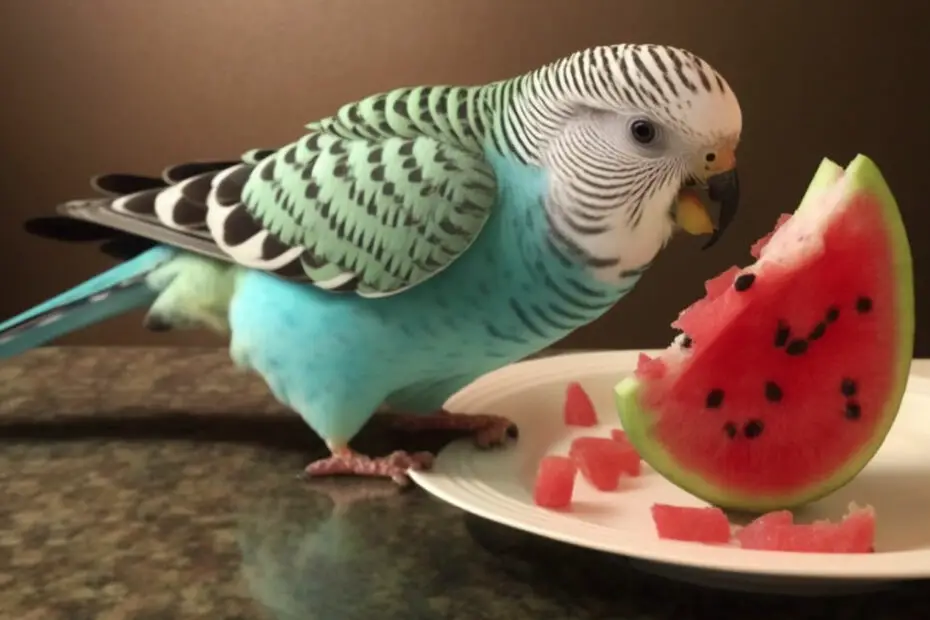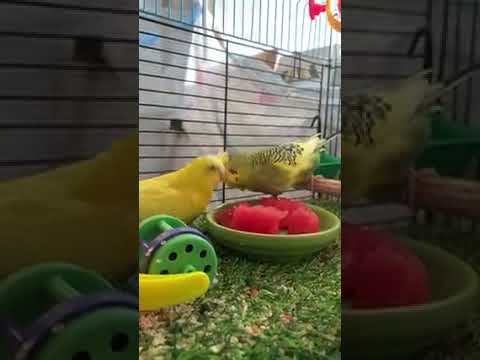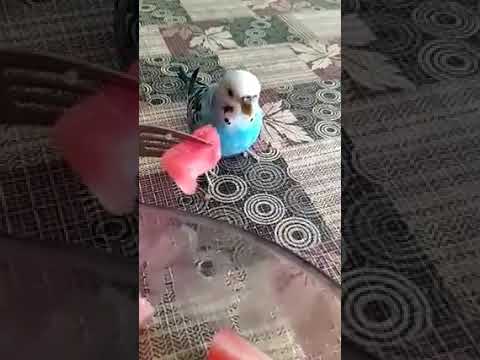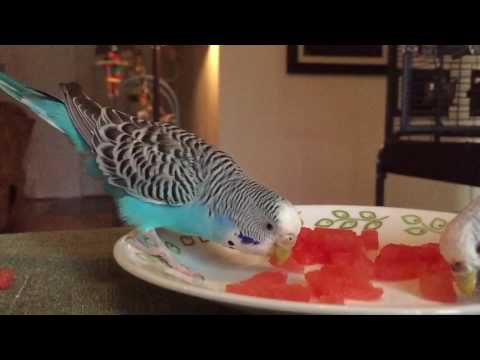So you’re wondering if the watermelon is a safe fruit to feed your budgies? If yes, this guide is for you. We have done lots of research on whether budgies can eat watermelon and compiled this comprehensive guide to help you out.
Can budgies eat watermelon? Yes, budgies can eat watermelon. The fruit is safe for budgies and contains plenty of water which can help your budgies stay cool and hydrated. It also carries essential nutrients that can help your budgie stay healthy. However, you should only feed watermelon to your budgie occasionally due to its high water and sugar content which can be detrimental to your pet’s health.
In this article, we dive into more details about feeding watermelon to your budgies, how to prepare them right away, what parts of the fruit to avoid, and other helpful info you need to know.
Can you feed watermelon to budgies?
You can feed watermelon to budgies as a sweet and crunchy fruit that improves their immune system organ health and keeps them hydrated. There are toxic fruits for budgies, but melon isn’t one of them.
It is a well-known fact that watermelon carries multiple nutrients that the budgie’s body requires for good health and wellbeing.
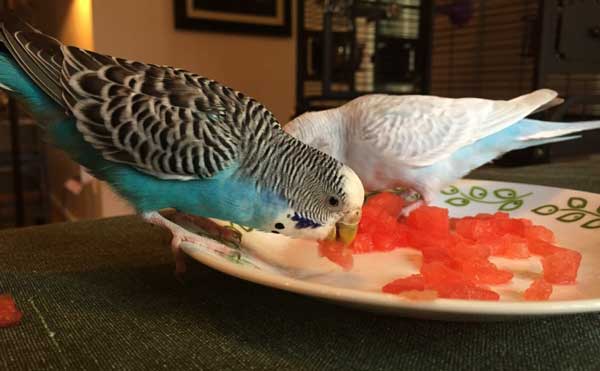
Watermelon is also a good fruit to feed your bird since it’s mostly comprised of water. Like human beings, birds need to stay hydrated throughout the day.
When feeding your budgies this fruit, prepare it correctly by removing the rind and the seeds. Cutting it into small pieces makes it easier for the birds to eat. (You’ll discover more details below on preparing watermelon for budgies).
However, don’t make watermelon a staple diet for your budgies. Too much watermelon can cause diarrhea in the birds. Feed them in moderation. It also contains high sugar content, which can cause health problems for your birds.
Consider watermelon as an occasional treat. And be sure to balance your bird’s diet with other fruits, seeds, and veggies to keep your budgies healthy.
Do Budgies Like watermelon?
As most experienced budgie owners agree, these birds love to eat watermelon! The nutritious fruit is a tasty and juicy treat that the birds love.
The many videos on YouTube showing budgerigars enjoying watermelon treats prove that these birds love these fruits.
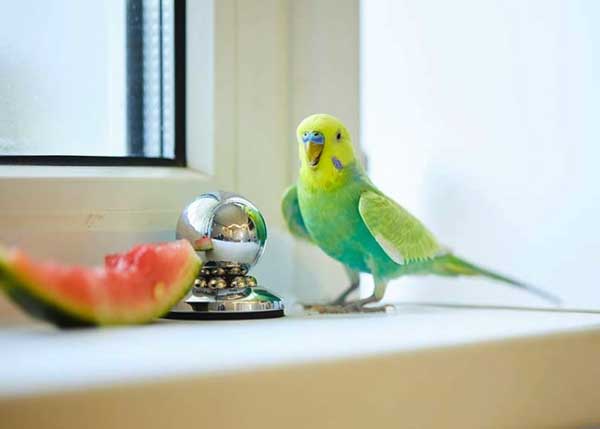
Your cut budgie will appreciate this fruit, especially if you give the fruit in the summertime or live in areas with hot weather. This is because the high water content will help keep them cool.
You may notice that your budgie doesn’t like the watermelon treat. This is perfectly okay and doesn’t mean your budgie has any underlying issue.
If this is your case, you can just remove the watermelon from the cage and consider treating your bird with other fruits. Don’t force the watermelon on the parakeet.
Just like you have preferences regarding which fruits you like, the budgies are no different. No matter how tasty and juicy, watermelon may not be a favorite for all birds.
Health Benefits For Budgies Eating watermelon
As we mentioned earlier, feeding watermelon to your budgies helps improve their organ health and immune system. The fruit also helps keep them hydrated. All these health benefits offered by the fruit are manifest through the nutritional value it provides.
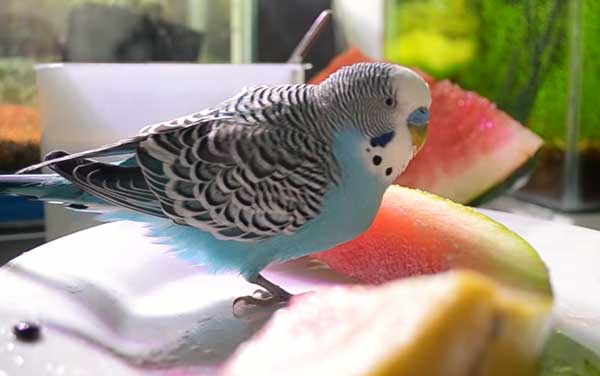
This is the nutritional content provided by a watermelon fruit:
Water
Watermelon has 92% water content (source), which is undoubtedly how it gets its name. Water is essential for parakeets as it keeps them hydrated, especially on hot summer days.
Vitamin A
Did you know that watermelon is one of the top fruits that pack high amounts of vitamin A? This is another essential vitamin your feathered friends need to keep their respiratory functions running smoothly.
Vitamin C
A weak immune system isn’t something you’d wish for your pet. So why not feed them with watermelon, which carries high amounts of vitamin C? This vitamin works tirelessly to keep the little bird’s immune strong. Plus, it helps with red blood cell formation if your bird lacks enough iron for the same.
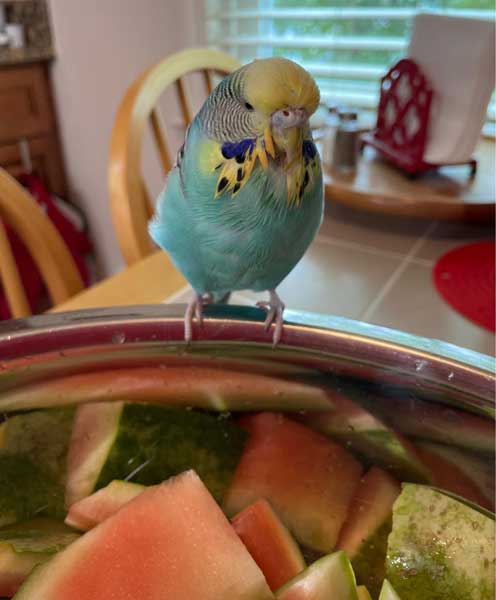
Lycopene
You see that red pigment in a watermelon? That’s where lycopene is stocked. This plant nutrient has antioxidant properties and goes a long way in helping your parakeet fight against sunburns or even severe health issues like cancer!
Potassium
Potassium is also present in the watermelon nutrient composition. It’s essential for maintaining fluid balance in your budgie’s body. Moreover, it helps improve and protect your pet’s nervous health.
Other nutrients your bird will get from eating a watermelon include protein, magnesium, calcium, iron, copper, carbs, and B vitamins. All these work together to keep the bird’s health in check.
How much watermelon should budgies eat?
Even though we have said watermelon is a nutritious treat for your bird, it’s important to observe how much you give to your budgerigars.
Overfeed them with this fruit, and they might not get any of its benefits. Instead, they might suffer from various problems such as diarrhea, obesity, or diabetes.
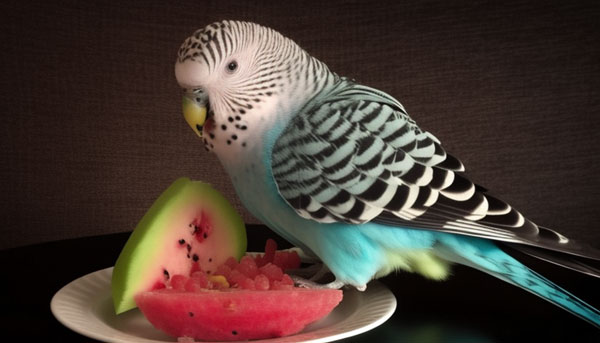
To avoid these problems, consider watermelon as an occasional treat for your budgies. A slice (or a few small chunks) of watermelon a week is enough treat for your bird. Anything more, and your bird might start showing irregular stools.
No matter how your birds seem to love watermelon, don’t be attempted to make it their staple diet. Remember, you still need to give a varied diet with a variety of fruits, veggies, and seeds to keep the bird healthy.
Observing its stool will also tell you if you’re giving too much watermelon to your budgie. Because watermelon has high amounts of water, it can easily cause your bird to have diarrhea.
If you notice your feathered friends producing a stool that’s looser than normal, consider cutting back on feeding them the fruit.
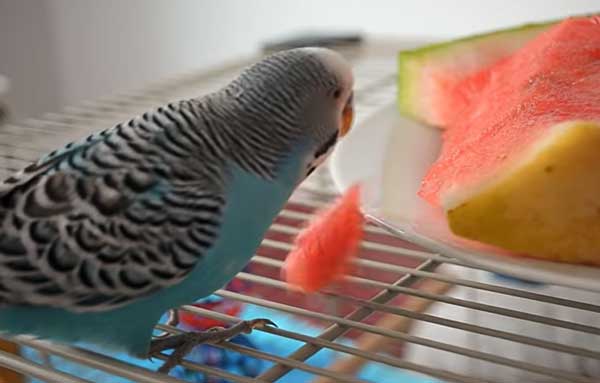
TIP: There are certain situations when watermelon will make great a regular fruit for your budgies. If your pet bird is still eating other foods but not drinking water, a watermelon will be a good way to keep it dehydrated.
How do you prepare budgie watermelon?
When giving your budgies watermelon for the first time, you want to ensure you do it safely so that you don’t bring any harm to your feathered friends. The preparation process for watermelon for budgies is pretty simple.
First, you must remove the fruit rind (i.e., the green part). Many toxic substances could be attached to the rid, including pesticides and fungicides, which could adversely affect your budgie’s health.
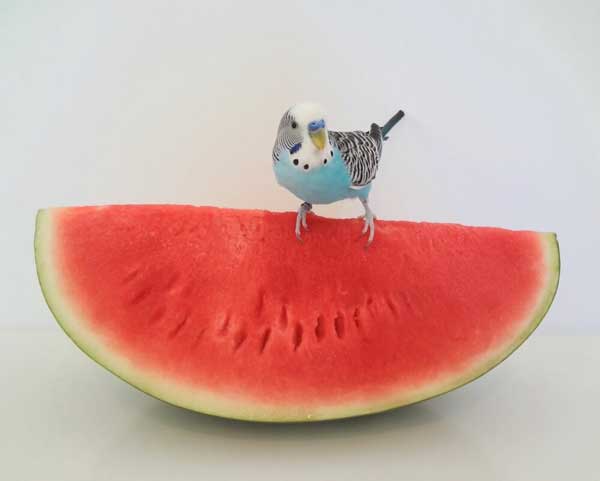
Some folks that rinsing the rind is enough to remove the unwanted substances. But we still argue that the safest way to serve this fruit to budgies is to completely eliminate the skin!
Don’t forget that the skin may also prove tough for the birds to digest
You’ll then need to cut the fresh fruit into small pieces. This makes it easier for the birds to eat them.
You may also remove the watermelon seeds from the fruit, though this step is optional. Watermelon seeds are harmless to budgies. However, if you’re worried that your birds might choke on them, just go ahead and remove them.
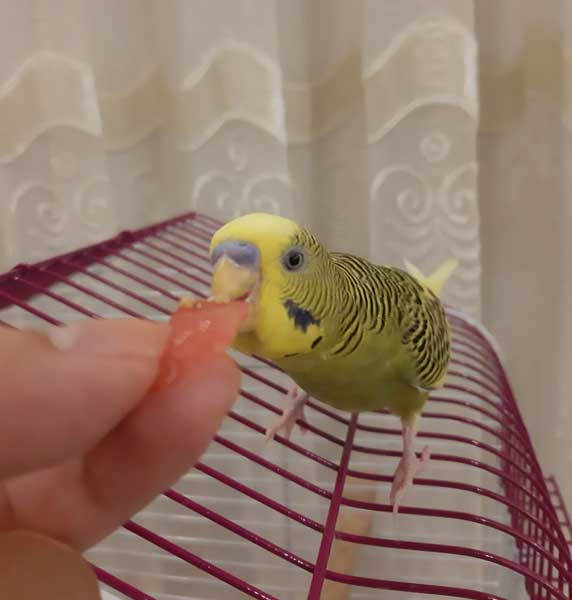
We also advise you to clean up the cage after your birds are done feeding. Budgies are generally messy eaters, and it is easy to imagine the mess they create by the time they’re done eating a juicy fruit like watermelon.
Can you feed watermelon to baby budgies?
Yes, you can feed watermelon to baby budgies. Like adult budgies, these young birdies will also enjoy eating this delicious and juicy fruit. The chicks, too, require all the nutrients offered by a fresh watermelon, making the fruit a healthy treat for them.
Before giving the fruit to the young budgies, make sure you properly prepare it to make it safe and easy for them to eat. Remove the rind and cut the flesh of the fruit into small chunks that the bird’s small beak can eat without any problems.
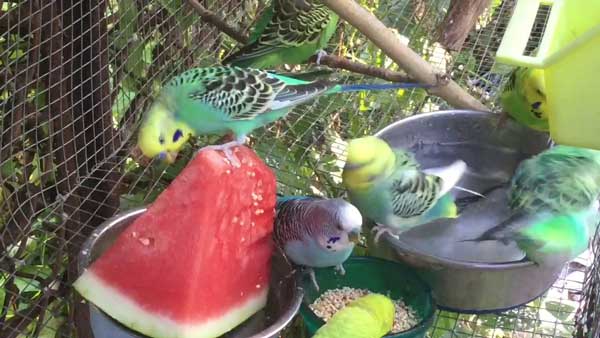
While we have already said the watermelon seeds are 100% harmless for budgies, you might want to remove them from the watermelon when feeding the baby budgies to prevent a potential choking hazard.
Your baby budgies might not like the watermelon, and that’s not a problem. Just take it from them and feed them with other types of fruit they like. No need to force-feed this fruit to the chicks.
Video of a budgie eating watermelon:
Here’s a video showing two budgies enjoying a treat of watermelon slices served by their owner. Notice how the owner slices the fruit into tiny pieces that are easy and enjoyable for the birds to eat.
Related questions (FAQ):
Watermelon is not poisonous to budgies. Fresh watermelon is 92% water, making it a great treat for keeping your bird hydrated and cool during those hot summer days.
The fruit also provides your feathered friends with various nutrients that keep their bodies in good health.
Watermelon may only present problems if you feed too much of it to your birds. Just give watermelon in moderation to your beloved bird (that is, as an occasional treat, say 1-2 times a week).
We don’t advise you to give your budgies the watermelon rind. This green part of the watermelon may be stocked with pesticides, harming your bird’s delicate body system.
Though you can eliminate these unwanted substances on the rind by rinsing, we still insist on giving your birds just the flesh part of the fruit. Better safe than sorry!
Budgies can eat watermelon seeds as they’re non-toxic. In fact, the fruit seeds are packed with important nutrients like proteins, omega 3 and 6 fatty acids, vitamins zinc, copper, etc. (Source). This makes them a nice treat for your birds, just like the fruit itself.
However, you should be mindful of the size of the seeds. If they’re not soft enough, they may easily cause a choking hazard for your budgie.
You don’t want this happening, so consider soaking these seeds in water before feeding them to the budgie. This will make them easier to swallow for your feathered buddies.
However, you may want to keep watermelon seeds away from the baby budgies until they’re big enough, as they’re highly likely to choke on them. Or even easier, get them a seedless watermelon.
Final Thoughts
You can feed your budgies those sweet and delicious watermelon slices without fear. The fruit is 100% safe and a good treat for your budgie, especially on those summer days when the weather is hot, and you want to keep your birds well hydrated and cool. The multiple nutrients packed in this fruit are another reason to feed them to your budgies.
To ensure you give your birds the melon the right way, get rid of the watermelon rind and seeds. Also, cut the melon into smaller slices to make them easier for your little feathered friends to eat. Remember to feed them fresh fruits every time and get rid of any leftovers after your birds eat to their fill.
Do you know if your budgies can eat apples or grapes? Read our articles about it to learn more.
